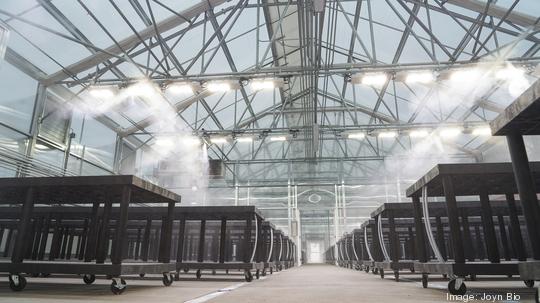
Joyn Bio, a startup research company launched four years ago with $100 million in funding from Bayer and Ginkgo Bioworks Holdings Inc., is opening a new 6,000-square-foot greenhouse in Woodland to develop bioengineered microbes for farmers.
Joyn Bio started in 2017 to develop microbes that colonize plants and help them absorb nitrogen. The new greenhouse will work in the development of microbes that help plants combat disease and insects.
Many biological control companies use microbes to brew up substances that fertilize or protect plants, CEO Mike Miille told the Business Journal. Joyn’s research is aimed at actually using the microbes to do that work.
The new greenhouse is on Bayer’s existing campus near Woodland, which was originally built by vegetable seed company Seminis. Seminis was bought by Monsanto Co. in 2005. Bayer bought Monsanto in 2018.
The Joyn employees in Woodland work in separate labs and greenhouses from Bayer, Miille said.
In 2019, Joyn’s Sacramento-area employees moved into 12,500 square feet of lab, office and greenhouse space in Bayer’s Woodland research lab. Bayer’s campus is a secure facility, and Joyn only has access to it because it is a research partner with the German chemical and agriculture giant. The new greenhouse is also separate from other Bayer work in Woodland.
Joyn is based in Boston, where 55 of its employees work on microbial engineering. The company has 20 employees in the Woodland research station working on testing and assays, Miille said. Joyn is using some of the research developed by Ginkgo Bioworks (NYSE: DNA).
In the case of fixing nitrogen, Joyn is developing a library of microbes that can work as a chassis to deliver desired actions to plants. The microbes, which are part of a seed treatment, grow with the plant to help it get the nutrient nitrogen from air and soil, so farmers don’t have to add as much or any nitrogen fertilizer. Fertilizer is expensive, and excess nitrogen runoff is a pollutant to waterways and drinking water.
In the case of pest resistance, the microbe chassis would likely be applied as a spray, he said.
Miille started with Joyn from Bayer in West Sacramento. He was previously the president of Davis-based AgraQuest Inc. Bayer bought AgraQuest, a maker of biologically based pest-control products, for about $500 million in 2012.
Joyn is still working with the original $100 million investment it got four years ago, and that original investment should be enough money to get it to having products on the market after three or four years, Miille said.
The nitrogen-fixing microbes will need to go through extensive testing. The pesticide applications will need approvals from the U.S. Environmental Protection Agency and state regulators.




